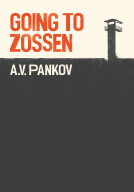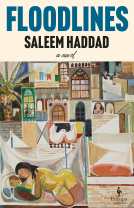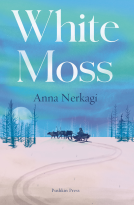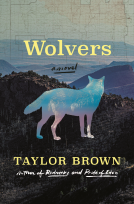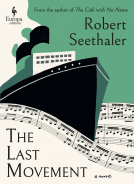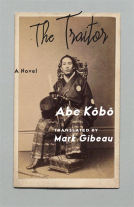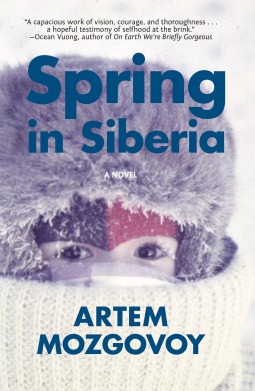
Spring in Siberia
by Artem Mozgovoy
This title was previously available on NetGalley and is now archived.
Send NetGalley books directly to your Kindle or Kindle app
1
To read on a Kindle or Kindle app, please add kindle@netgalley.com as an approved email address to receive files in your Amazon account. Click here for step-by-step instructions.
2
Also find your Kindle email address within your Amazon account, and enter it here.
Pub Date Apr 04 2023 | Archive Date Jun 08 2023
Talking about this book? Use #SpringinSiberia #NetGalley. More hashtag tips!
Description
“A work of earnest, grounded, and ultimately hopeful testimony of selfhood at the brink." —Ocean Vuong
1985. Russia. As the Soviet Union disintegrates and Western capitalism spreads its grip across their land, the Morozov family finds itself consigned to the remote, icy wastes of Siberia. It is here that their only child, Alexey, is born.
A sweet and gentle schoolboy, Alexey discovers that reciting poetry learnt by heart calms his fears. That winter gales can be battled with self-invented games, and solace found through his grandmother’s rituals and potions. But when Alexey’s classmate, the son of KGB agents, confesses his love, the desire of two boys to be together clashes violently with the mad world around them.
Exploring the healing power of literature, the magic of first love, and the ways our family and homeland can save (or shatter) us, Spring in Siberia is a coming-of-age novel that, in the darkest of times, glows with hope and the yearning for freedom to be oneself – completely.
Advance Praise
“A capacious work of vision, courage, and thoroughness, Spring in Siberia upholds the original promise of the novel: which is to contain all, protect nothing, and to shift perpetually in definition and scope. A work of earnest, grounded, and ultimately hopeful testimony of selfhood at the brink.”
– Poet, essayist, and novelist Ocean Vuong is the New York Times best-selling author of On Earth We’re Briefly Gorgeous.
“I read this and was very very impressed. It was touching and well written, genuinely compelling and convincing.”
– Writer, actor, and director Sir Stephen Fry is the author of, among many other international best-sellers, Troy, Mythos, and Heroes.
“There are writers who have talent, and there are writers who have fascinating stories to tell, and it’s not all that often that the two, blessedly, meet. But in Artem Mozgovoy’s Spring in Siberia they have indeed met—with a directness and clarity and acute sense of observation and of the childhood world around him that is as rare as it is invigorating. The story of an overly sensitive and creative child trying to thrive and survive in an adult world often impervious to his gifts is hardly a new one, but what Mozgovoy does in this moving and richly observed memoir is to shed new light on that age-old theme, as well as providing a kind of mini-history of the post-Gorbachev Russia and a deeply textured portrait of conflict-torn Siberian life. This is a wonderful book about a fascinating though troubled childhood by a deeply talented and original writer who had both the wits to survive it and the talent to transform it into art. It reaffirms my belief in both the healing power of literature and its ability to broaden the sympathies of all those who are fortunate enough to enter its domain. I admire it, and him, deeply.”
– Poet, novelist, essayist, and short story writer Michael Blumenthal is the former Director of Creative Writing at Harvard.
“With Spring in Siberia, a new, heady Russian dish—sweet, sad, savage and resolutely gay—has been brought in triumph to the table of American writing.”
– John Clanchy, Australian and international prizewinning author.
Marketing Plan
Marketing:
- Pre-pub buzz-building campaign
- Online marketing
- Social media campaign
- Targeted email marketing
- Community outreach
- Text-generated flash fiction campaign ahead of launch
- e-newsletters and websites
- Book club outreach
- Library outreach
- Course adoptions
Publicity:
- Media attention
- Online review and feature attention
- Local author promotion: Brussels, Belgium
- Social Media Campaign
- Book & author festival outreach
Social Media:
- Instagram: @artemograph
- https://www.artemmozgovoy.com/
Available Editions
| EDITION | Other Format |
| ISBN | 9781636280707 |
| PRICE | $18.95 (USD) |
| PAGES | 256 |
Links
Available on NetGalley
Average rating from 11 members
Featured Reviews
 Florian R, Reviewer
Florian R, Reviewer
An absolute “must have”, “must read”! This book’s initial promise of beauty and strangeness is entirely fulfilled by a prose deceptively simple that takes you on a path to knowledge - of what it means to grow up in a place where you don't belong, of how it feels to be an outsider when everything you want is to be sheltered and allowed to blossom. Through the eyes of the main character we see the greyness of late Soviet times, masterfully balanced with portraits of people still kind and courageous (the grandmother). The rough, dangerous first steps into capitalism at the beginning of the ‘90 provide a background for teenage aspirations and ideals, while giving space to characters more complex (the mother, the gipsy lady) or somber (the KGB family, the teacher).
I love the way this book avoids the traps of both idealization and cynicism to ultimately deliver a message of hope. But might spring arrive in Siberia too? Pick up a copy and you shall find by yourself.
 Catherine A, Reviewer
Catherine A, Reviewer
A beautiful book
Read this book! It’s a passionate coming-of-age story as well as a lens into the missed opportunities of Perestroika and post-Soviet Russia. Siberian Alexey is growing up looking for love, for artistic expression, and for simple freedom – the thing that we in luckier countries take for granted. He and his family struggle against a developing society of graft and thuggery – Alexey is beaten up daily after school by criminals newly released from the gulags because he looks ‘different’. His mother’s little shop is torched, probably by a self-styled ‘security’ gang.
Artem Mozgovoy writes beautifully with a purity of expression which perhaps comes from his writing in a second language, and also from being a poet. The imagery is striking and memorable: the claustrophobia of a tiny apartment in a grey block like every other grey block, being stranded in a snowy waste on a first attempt to see live theatre, the enchantment of his babushka’s cottage in the forest, a small boy lying down on the road because he thinks he has been abandoned, secret love on a balcony.
I would strongly recommend this poignant story of Alexey’s consuming longing for freedom fighting with the loves he will leave behind and the sadness of abandoning his troubled country
 Austin A, Book Trade Professional
Austin A, Book Trade Professional
A beautiful, moving tale of love in one of the harshest places on earth. I would recommend this book to everyone I meet.
 Andrew P, Media/Journalist
Andrew P, Media/Journalist
Coming of age in late twentieth century/early twenty-first century Russia is the subject of expatriate journalist Mozgovoy’s début novel, which, based on the author’s fascinating bio, could be classified as a fictionalized memoir. Rich in details about the country’s turbulent and contradictory history over the past century, the book is timely for the American public while many of us struggle to understand the reasons for Russia’s 2022 invasion of Ukraine and the very nature of the Russian state and its people. Mozgovoy offers an extraordinary first-person account of life for average Russian citizens as well as the specific plight of LGBTQ+ individuals, and what he has to say is bold, harrowing, and damning.
Like the author, the narrator of the story, Alexey, was born in a remote, industrialized town in Siberia in the mid 1980s. We meet Alexy as a young boy, just a few years prior to perestroika and the ensuing dissolution of the U.S.S.R.. His vibrant rendering of his hometown and the period sweeps you off your feet. For the American lay reader, Siberia evokes images, gleaned from popular culture and perhaps clichés, but to read Mozgovoy’s passages is to see and, against one’s hopeful inclinations, to believe. In Alexey’s subarctic town of Taiga, winter lasts for half the year. For much of the season, the sun rises at ten in the morning and sets before five o’clock in the afternoon. Alexey must hike each day through snow drifts, in the dark, in -40 Celsius temperatures, to make his way to school. It’s a mile-long journey in each direction. The climate alone is overwhelming, and then we’re introduced to the boy’s sadistic teachers and classmates.
One is quickly aware that this is going to be a story of hardship and struggle, yet I found myself unprepared for the dimensions of that motif. In the tradition of classic Russian authors, Mozgovoy writes with such evocative detail, locations are like characters in and of themselves, and they are bleak, hopeless and hardened, exploited by the cruelty of a centuries-long succession of authoritarian rule, just as the Russian people have been.
Taiga is by design unremarkable. Its concrete apartment houses were built to transplant workers to the town’s factories, and they are so plain and identical, young Alexey has trouble finding his way home. In any given month, those workers, including Alexey’s parents, may or may not get paid for their labor due to the dysfunctional government-run economy. As a result, organized crime and alcoholism are rampant (and supported by corrupt law enforcement), and no one truly believes in the possibility of self-improvement. Yet, with all the discontents of Alexey’s working-class peers and their families, they have it better than the ethnic natives who live in dirt huts in the marshy slums, abutting a barely disguised mass burial ground that was a prison camp during Stalin’s Great Purge of middle-class “enemies of the state.”
The fact that this is a story about real life people makes Mozgovoy’s novel more horrifying than any post-apocalyptic dystopia a science fiction writer could come up with.
There are slender rays of sunlight in Alexey’s world, most significantly when he spends the summer with his babushka in her farming village. Isolated from industrialization (at least for a time), his babushka gets all she needs from the land, and she’s generous and loving and eternally optimistic. Perhaps through a combination of shared nature and her abundant nurture, Alexey wants to believe the best of the world even as he’s harangued and shunned by peers and his own father due to his ‘effeminate’ looks and interests in ballet and poetry. Scalding disillusionment awaits him as he develops as a gay adolescent in a society where violence against LGBTQ+ people is a principal outlet for the emotional toll of systematic deprivation.
Mozgovoy writes that bringing attention to the terrors inflicted on queer people in Russia was his goal in publishing Spring in Siberia (and a forthcoming follow up novel about Alexey’s life after escaping to Western Europe). In that, he has achieved a much-needed spotlight on a human rights atrocity. The life choices for boys like him are suicide, heroin addiction, or risking illegal immigration, if one has the means.
I would argue that the author has accomplished even more than a portrait of queer struggle. Through Alexey’s story, he illuminates the complex histories of the Russian state, entwined as they are in the persecution of sexual minorities, yet vaster, seemingly impenetrable, a monster that eats its own young. What Mozgovoy presents is a repeated cycle of governance by deception and brutality from the Tzarist era to the false promises of socialist revolution to Stalin and his autocratic successors all the way to Putin, who Mozgovoy indicts as the enabler of the country’s vicious homophobic turn. To be honest, in spite of all the historical references, one feels that it is still incomprehensible, which is probably precisely what the author set out to accomplish.
A remarkable work that is both a poignant story of queer coming-of-age and a breathtaking history of modern Russia.
Reviewed for Out in Print.
Readers who liked this book also liked:
Rachel Joyce
Historical Fiction, Literary Fiction, Women's Fiction
